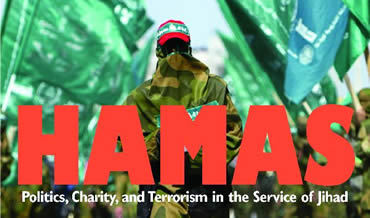![]()
Mon, June 20, 2011 | Rubin Reports | By Barry Rubin
Understanding Hamas, A Detailed Assessment
This article is published in the Toronto Globe & Mail and is presented here with some additions:
What do you have to do to be recognized as a revolutionary Islamist group using terrorism, backed by Iran (and now probably a radicalized Egypt), seeking to wipe Israel off the map and kill the Jews? It isn’t easy. People keep trying to make you into something else: incipient moderate? Multifaceted debating society? Insisting that you just don’t really mean it?
Such is the case with Hamas. Every day — in speeches, articles, violence, mosque sermons, and media, Hamas makes its positions absolutely clear. And every day someone in the West just doesn’t want to believe it.
Now Hamas has formed an alliance (of convenience?) with the Palestinian Authority (PA), run by Fatah and governing the West Bank. It’s a remarkable situation — or would be anywhere outside of the Middle East.
After all, Hamas won an election, made a deal with the PA, and then staged a coup to take over the Gaza Strip that included shooting dead wounded Fatah fighters in hospital. Fatah and the PA regularly repress Hamas on the West Bank. So why are they “working together”? The PA wants to show unity to the world; Hamas hopes that it can take over the PA.
Is it true that “as older leaders of Hamas claim some degree of moderation, younger radicals refuse to give up violence?” Not exactly. First, there is no real division along age lines. Nor is it all but merely some leaders of Hamas who “claim” some moderation.
But what’s important is that word “claim.” They do not claim it in Arabic, they do not claim it when talking to their people, and they do not claim it on their television stations or their debates with the PA and Fatah. They only claim it when they are talking to Westerners, usually reporters or sometimes diplomats. In other words, it is just a public relations’ exercise.
What about the “Salafi-Jihadist” groups? Clearly, there are some differences, often relating to external alliances. Hamas is a Muslim Brotherhood group; the dissidents sympathize with al-Qaida. Yet they don’t pose any serious challenge since Hamas is far stronger. Hamas also uses them as deniable purveyors of attacks on Israel, assaults that Hamas can allow but also deny. The most important non-Hamas group, Palestinian Islamic Jihad, very much plays that role.
There has been some effort to set up a distinction between Hamas, as the relative moderates, and the new small groups as the radicals. This would legitimize Hamas as protecting everyone from the real extremists. But the problem with these other groups — and that includes al-Qaida — is that they are too tactically inflexible. They only use violence rather than base building; reject elections; and never pretend to be moderate.
Thus, while these groups can stage terrorist attacks or violence, they are not the real threat. Unlike the Muslim Brotherhood, or Hamas, or Hizballah, they cannot take over whole countries. And if in the Gaza Strip they ever do challenge what Hamas wants to do, they will be slapped down without mercy. That’s not because Hamas is moderate but because it will accept no rival.
Indeed, one reason why salafi-jihadist groups have not been successful among the Palestinians is that there is already a strong Islamist organization — Hamas — which can combine the nationalist and religious cards. Among the Palestinians, Hamas are the Salafists and Jihadists. Who needs any alternative?
The article states that “a generation of Hamas leaders, now mostly in their 60s, that wants to deal, that’s willing to agree to establishing a Palestinian state within Gaza and the West Bank as defined by the Green Line, the ceasefire line that separated Israelis from Jordanian and Egyptian forces until June, 1967.”
But this is misleading, as the article goes on to explain. For whenever these Hamas leaders discuss such an idea they make absolutely and explicitly clear that this is a temporary measure, a temporary truce, designed to get a state that can be used as a platform for destroying Israel. The PLO accepted such a “two-stage strategy” more than 35 years ago but no one thought that was moderate at the time.
Who needs “radicals” when you have Hamas. Incidentally, the same arguments can be applied to the Islamic Republic of Iran or the Muslim Brotherhood in Egypt or any number of other militant groups. There is always someone even more radical. But the most extreme of the extreme simply are not good at building a mass organization, in part because they are so much on the edge.
There is another assumption made in dealing with Hamas that is also very dangerous. It is presumed that the PA will moderate Hamas. Yet it is more likely that Hamas would radicalize or take over the PA. Many times before, it has been seen around the world that highly disciplined groups with a clear ideology have the advantage of looser, corrupt and ill-defined rivals.
But Hamas is also more dangerous precisely because it is more flexibly clever. The naïve super-radicals want to convert the Gaza Strip into an imitation of Taliban Afghanistan overnight. Hamas leaders understand, however, that they must go step by step so as not to antagonize the population so much as to lose power or to show the West their true intentions so much that it might do something about the danger Hamas poses.
Thus, Ghazi Hamad, Hamas’s deputy foreign minister, explains the situation in the article: “No one is more experienced in resistance than Hamas. No one has more martyrs…..Resistance has cost Gaza a lot of lives and a lot of damage. We need to evaluate each situation” before waging resistance.’
What he’s saying here is that Hamas isn’t moderate, it just isn’t stupid. Compare Iran and Afghanistan, for example, the Islamic republic of Iran has known — even while sponsoring terrorism and subverting neighbors — how to be cautious and when to be brutal. The regime is still in power after more than three decades. The Taliban was foolhardy and adventurous, getting involved in the September 11 attacks against the United States. Its leaders are now living in caves.
At the end, the question is asked: “Which side of Hamas will prevail?” But aside from interviews given in English for the express purpose of fooling people there is no evidence that there are two sides of Hamas.
The Toronto Globe & Mail should be praised by seriously studying this issue, at a time when many newspapers in other countries increasingly “dumb down” their coverage. But the question remains how Hamas should be understood.
The advisor on counterterrorism to President Barack Obama once explained that Hizballah couldn’t be terrorists because it included lawyers. But who says that a revolutionary Islamist movement must merely be drooling terrorists saying, “Kill, kill, kill!” Even the Nazis weren’t like that and neither were the Stalinists. Of course, there are intellectuals and doctors, teachers and engineers, involved in the movement, as in all revolutionary Islamist movements. So what?
Quickly, however, in such discussions there is a felt need to discover a spectrum of views when no significant differences exist, or at most they are purely tactical emphases. For example, an article in the Toronto Globe & Mail says that Hamas has “disavowed suicide attacks in recent years.” In fact, they have claimed many such attacks. They might disavow certain specific attacks that are inconveniently timed. That isn’t moderation it is political cleverness.
That article notes: “Hamas-backed militias regularly rain rockets down on targets inside Israel.” Yes, but so does Hamas itself. Other militias have been used as fronts since Hamas’ defeat by Israel in 2009 so that Hamas can pretend it isn’t violating the ceasefire. Yet this is a thinly veneered trick since Hamas verbally supports the attacks, does nothing to prevent them and never punishes them afterward. Compare this to the bloody crackdowns of Hamas — as discussed in the article — when it really does feel its power and policy challenged.
Another important misunderstood point made in the same article says, “Hamas members remain the elected representatives of a large chunk of the Palestinian people, placed there by a fair exercise in democracy.” That is true as far as it goes. But many people think Hamas governs the Gaza Strip because it won an election. First, it won an election, then it made a coalition deal, then it seized power by force.
In stating the usual juxtaposition, the article compares Hamas, “committed to the destruction of the Jewish state,” with Fatah and the PA, “moderate and secular.” While there is certainly truth in this distinction it is also dangerously misleading. For it suggests that these two groups are like oil and water. Yet while there are hardline and very pious forces in Fatah, there are no moderates and secularists in Hamas. Thus, Hamas can appeal to a lot of Fatah supporters but not so much the other way around.
The article states, “It would be unrealistic to think that Hamas will fade away.” Absolutely right. But it is more possible that it will win control of the Palestinians altogether. True, as the article correctly states, people in the Gaza Strip have a lower living standard than those in the West Bank living under PA rule (mainly because the latter receive high levels of international aid). But is that enough to sustain Fatah?
Suppose an independent Palestinian state is established after an agreement with Israel and internationally supported. What would happen if some time later Hamas seized power by force, won an election, or formed a coalition with some younger Fatah cadre to rule. It would tear up the agreement with Israel — as is about to happen in Egypt — and return to the conflict with itself much stronger and Israel weaker than is true at present. Such a scenario is a very realistic one.
Even short of that, Hamas would maintain that it had the right and duty to attack Israelis (whether or not it publicly claimed responsibility for doing so).whenever that was politically profitable. Is a Fatah or coalition government really going to stop them from doing so?
Meanwhile, Hamas preachers and teachers would be telling young people that being a jihad fighter or a suicide bomber is the most properly Islamic and wonderful thing they could do with their lives. How easily could moderates compete with such appeals, especially when — as we have seen elsewhere — moderates would be subject to intimidation or even assassination.
But actually the world should continue to shun Hamas for reasons having nothing to do with Israel. The Middle East today faces a huge internal conflict. That is the region’s main feature. The battle is between Islamists — be they Afghan, Iranian, Arab, or Turkish — and a much-varied set of nationalists, liberal reformers, and traditionalists. The mix is different in every country.
This battle is similar to the great struggles in Europe once caused by Communists and fascists. It is not merely a matter of Islam or Muslims because most of the people on the anti-Islamist side are also Muslims who think they are just as properly Islamic as the revolutionaries.
Giving international recognition or help or legitimacy to Hamas helps the radical Islamist side. It entrenches the Gaza Strip as a revolutionary statelet on the Mediterranean Sea, backed by Iran, using terrorism, dedicated to genocide against Israel and to subverting all of the relatively moderate Arab states.
It indoctrinates children to be future terrorists, to hate and kill Jews, expels Christians, subjugates women, and supports the murder of gays. In addition, it advocates the expulsion of Western influence from the region and opposes virtually all Western interests. A Hamas regime is bound to return to war again in the not-distant future. The group’s radicalism will kill any hope for a peace process between Israel and the PA. Hamas in power means a totalitarian state using torture and ferocious repression.
And it also furthers the revolutionary Islamist movements’ efforts to dominate the Middle East and spread their doctrine and power to Western countries.
A handful of carefully tailored English-language interviews by some Hamas leaders (while they and others speak very frankly and in a totally opposite way in Arabic) changes nothing. The group’s actions speak louder than such words. Their television shows directed at children tells more than soothing words meant to lull the West to sleep.
About the author,
Barry Rubin is director of the Global Research in International Affairs (GLORIA) Center and editor of the Middle East Review of International Affairs (MERIA) Journal. His latest books are The Israel-Arab Reader (seventh edition), The Long War for Freedom: The Arab Struggle for Democracy in the Middle East (Wiley), and The Truth About Syria (Palgrave-Macmillan). The website of the GLORIA Center is at http://www.gloria-center.org and of his blog, Rubin Reports, http://www.rubinreports.blogspot.com.



 RSS
RSS











Latest Comments
Hello Mike, Thank you for your positive feedback to the article. I felt there wasn’t too much critical analysis of ...
Thanks for this considered and well constructed article. A follow up article on the manner in which the editorial contro...
THE CLUELESSNESS OF CLAIMING THAT OBAMA'S MIDDLE EAST POLICIES WERE A FAILURE CANNOT BE FURTHER FROM THE TRUTH, WHAT THE...
As long as Obama is the president of the usa do not trust the us government......
Thank you for an good read....